You're probably familiar with the use of antibiotics in humans, but have you ever considered their role in your cat's health? Just like us, our feline friends can suffer from bacterial infections that require antibiotic treatment. However, administering these drugs to cats isn't always straightforward. It's crucial to understand the types, uses, and potential side effects, not to mention the risk of antibiotic resistance. So, how do you decide when antibiotics are necessary and how to use them safely? Let's explore this together, shall we?
Understanding Cat Antibiotics
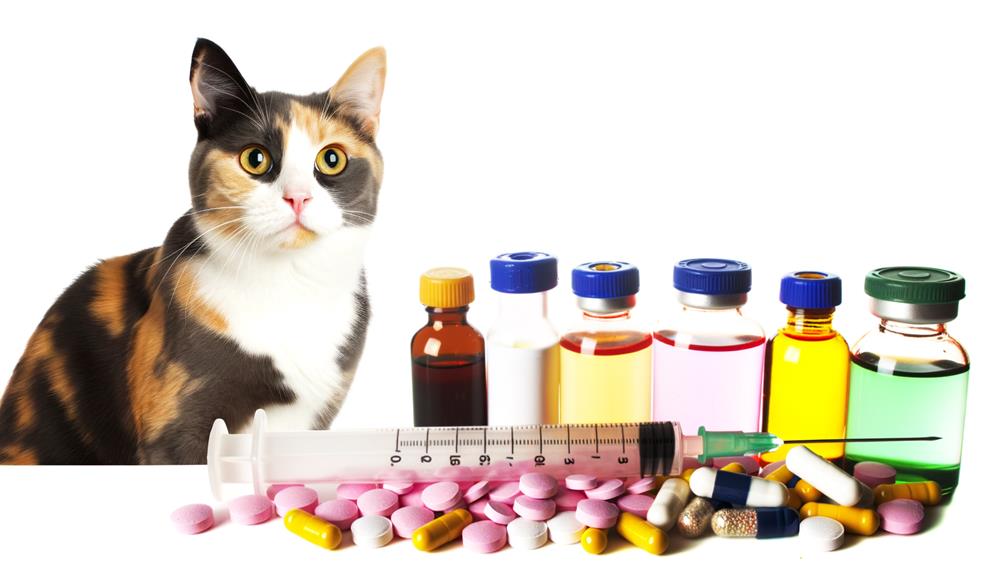
To fully grasp the concept of cat antibiotics, it's crucial to understand their purpose, usage, and potential side effects. Just like humans, your feline friend can fall prey to bacterial infections. When that happens, antibiotics are the go-to solution, acting as a powerful weapon to kill the harmful bacteria.
But, keep an eye out for antibiotic allergies. Some cats can have adverse reactions to certain antibiotics, which can manifest as vomiting, diarrhea, loss of appetite, or more severe signs like difficulty breathing or swelling. If you notice such symptoms, call your vet right away. It's essential to understand this risk to ensure your cat's safety.
The antibiotic cost can also be a significant factor. Prices can vary wildly based on the type of antibiotic, dosage, and the length of treatment. However, don't let cost deter you from providing the necessary care for your pet. There are plenty of affordable options, and your vet can help you find a suitable, cost-effective solution.
Common Bacterial Infections in Cats
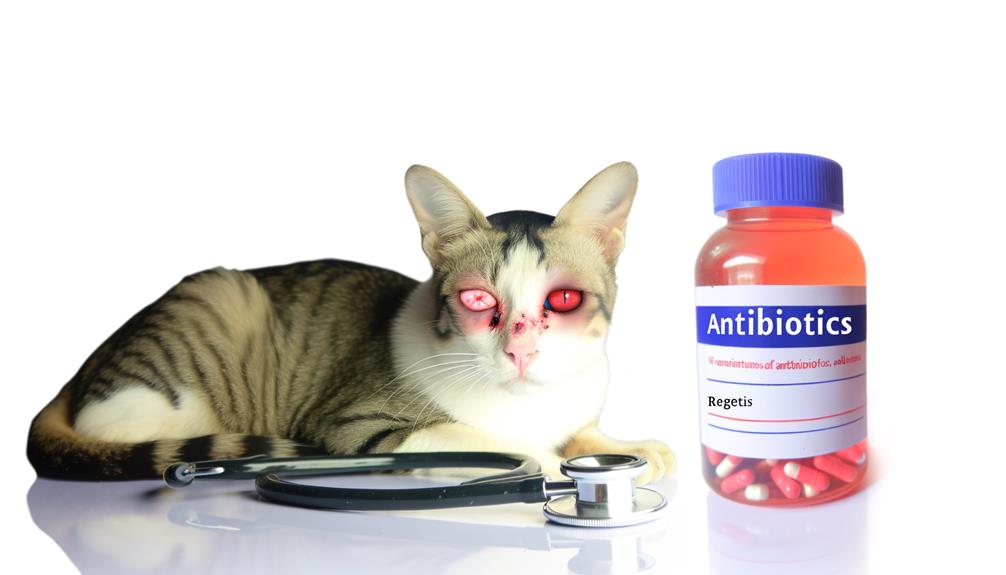
You're about to learn about common bacterial infections in cats, the popular antibiotics used to treat them, and how to prevent future infections.
Understanding these infections can help you keep your furry friend healthy.
Let's start with identifying these infections.
Identifying Cat Bacterial Infections
If your feline friend starts showing unusual symptoms, they might be battling one of the common bacterial infections that cats often face. Observation of infection symptoms is key to identifying these issues early. Look out for signs like loss of appetite, lethargy, or changes in behavior. Additionally, physical symptoms such as a fever, cough, or abnormal discharge can also indicate an infection.
Bacterial identification techniques play a crucial role in diagnosing your cat's condition. These can involve laboratory tests like cultures or microscopic examinations. Remember, it's important to consult with your vet if you notice any concerning changes. They can accurately diagnose your cat using professional techniques, ensuring your furry friend gets the right treatment.
Popular Antibiotics for Cats
When your cat's battling a bacterial infection, certain antibiotics can be game-changers in their recovery process. Popular antibiotics include Amoxicillin, Tetracycline, and Clavamox, known for their effectiveness against common infections. However, it's crucial to keep in mind the possibility of antibiotic allergies. Your cat might show signs like swelling, itching, or difficulty breathing, signaling an allergic reaction. If this occurs, you must contact your vet immediately.
Another significant aspect is resistance prevention. Overuse of antibiotics can lead to resistance, making it harder to treat future infections. Always stick to the prescribed dosage and never use antibiotics without vet approval. This way, you'll ensure your cat gets the best treatment without compromising their long-term health.
Preventing Future Infections
To keep your cat healthy and prevent future bacterial infections, it's essential to understand common diseases and their causes. An infection prevention diet plays a significant role. High-quality, balanced food boosts your feline's immune system, helping to fend off harmful bacteria. Consider adding probiotics to their diet, as they promote good gut health, a critical factor in infection prevention.
Hygiene routines are equally important. Ensure your cat's living area is clean, and regularly wash food and water dishes. Regular grooming helps keep their skin and fur free from bacteria. Don't forget dental hygiene, as oral bacteria can lead to severe infections.
In a nutshell, preventing infections in cats revolves around a good diet and proper hygiene. These simple steps can save your kitty from future health problems.
Types of Cat Antibiotics
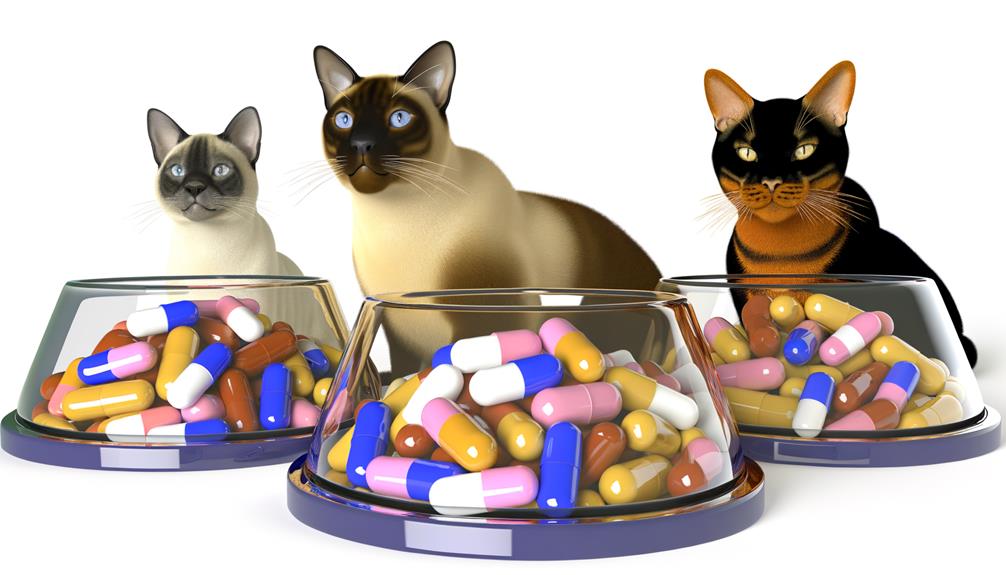
There are numerous types of antibiotics available for treating various infections in cats. Each type has its unique properties, uses, and potential risks. It's important to understand that not all cats react the same way to a particular antibiotic. Some may develop antibiotic allergies, which can cause symptoms like itching, swelling, and difficulty breathing. If your cat shows any of these signs after starting a new antibiotic, contact your vet immediately.
Beyond allergies, you should also be aware of possible antibiotic interactions. Some medications can interact negatively with certain antibiotics, reducing their effectiveness or causing harmful side effects. Always inform your vet about any other drugs your cat is taking to avoid these potential problems.
Among the common types of cat antibiotics are amoxicillin, doxycycline, and erythromycin. Amoxicillin is often used for skin infections, while doxycycline is frequently prescribed for respiratory or urinary tract infections. Erythromycin is typically chosen for eye infections. Each of these antibiotics works in a specific way to combat harmful bacteria.
When to Use Antibiotics
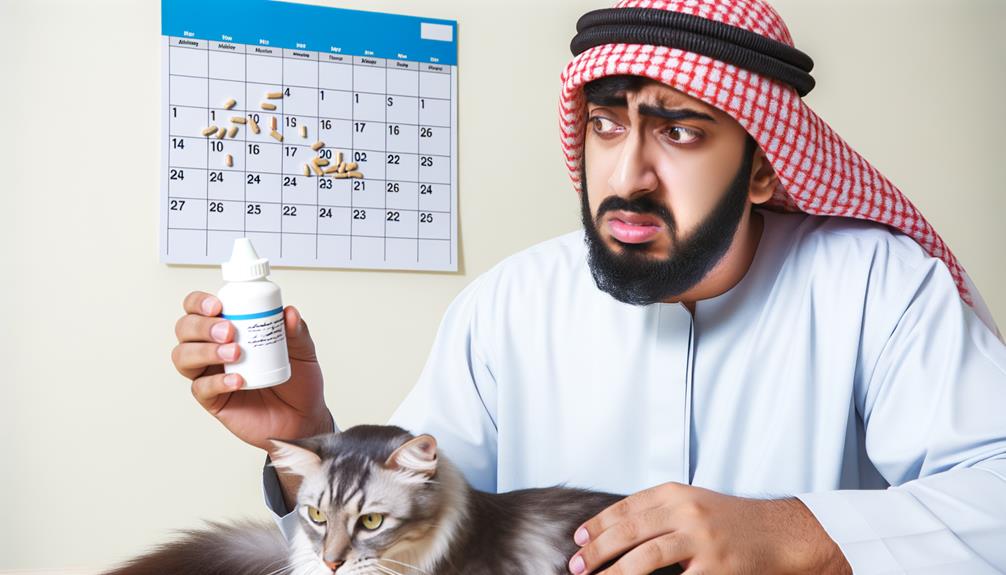
Navigating the world of feline health, you'll find that antibiotics aren't always the go-to solution; they're reserved for specific instances where bacteria are the proven culprits. The decision to use antibiotics should be taken seriously and should be based on a vet's diagnosis.
Here are four crucial situations when antibiotics may be necessary:
- Infection: If your cat has an infection, especially one that's bacterial, antibiotics are typically used. This could be a skin, ear, or urinary tract infection.
- Surgery: Antibiotics can be given before, during, or after surgery to prevent infection.
- Dental Disease: If your cat suffers from dental disease, antibiotics can help manage bacterial growth.
- Chronic Conditions: For diseases like chronic respiratory issues, antibiotics may be needed if bacterial infections are a recurring problem.
However, it's important to remember that not all cats can safely take certain antibiotics due to Antibiotic Allergies. Your vet will help you understand if this is a concern for your pet. Additionally, Antibiotic Storage is key. Incorrect storage can affect the efficacy of the drug, potentially harming your cat or rendering the medication useless. Always follow storage instructions to ensure the safety and health of your feline friend.
Safe Administration of Cat Antibiotics
You need to know how to safely administer antibiotics to your cat.
It's not just about giving the medication, but knowing the right dosage too.
Let's get a handle on understanding cat antibiotics and the guidelines for their use.
Understanding Cat Antibiotics
Administering antibiotics to your cat safely requires a clear understanding of the medication's purpose, dosage, and potential side effects. It's crucial you're aware of the possibility of antibiotic allergies and know about natural remedies for minor infections.
Here are four key points to remember:
- Antibiotics aren't always necessary: Don't rush to give your cat antibiotics for minor ailments. Sometimes, natural remedies can work wonders.
- Understand antibiotic allergies: Some cats may have adverse reactions to certain antibiotics. Know the signs of an allergic reaction.
- Follow the vet's instructions: The vet knows best. Always follow their advice when administering antibiotics.
- Monitor your cat closely: Keep an eye on your cat's behavior after giving antibiotics. Any change can be a sign of side effects.
Antibiotic Dosage Guidelines
When it comes to giving your cat antibiotics, it's essential to get the dosage right. An incorrect dose can harm your feline friend, causing serious health problems. Dosage adjustment is a crucial part of any antibiotic regimen. Too much can lead to antibiotic resistance, while too little may not effectively fight the infection.
It's vital to follow your vet's instructions carefully. If you're unsure, always ask for clarification. Remember, the goal is to ensure your cat's antibiotic tolerance. This means your cat can safely take the medication without adverse effects.
In some cases, your vet might adjust the dosage based on your cat's reaction to the drug. Hence, observing your cat during the treatment period is important. Always consult your vet if anything seems off.
Potential Side Effects
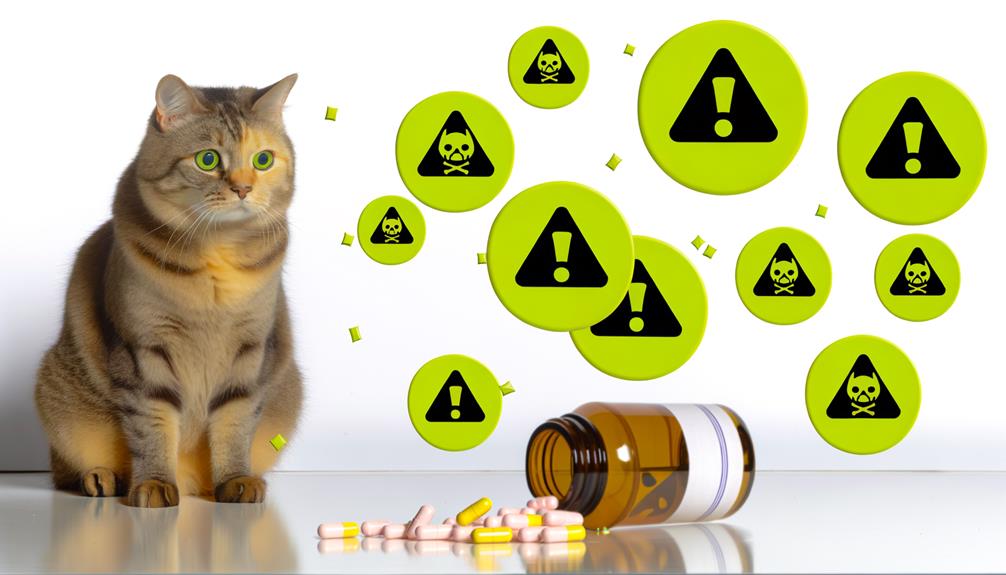
Potential side effects can crop up, even though antibiotics are generally safe for cats. Allergic reactions and antibiotic interactions are two of the most common concerns pet owners should be aware of.
Allergic reactions can range from mild to severe. Some cats may develop skin rashes, hives, or swelling. In severe cases, they may experience difficulty breathing or even anaphylactic shock. It's important to monitor your cat closely after starting a new antibiotic and contact your vet immediately if you notice any signs of an allergic reaction.
Antibiotic interactions can occur if your cat is taking other medications. Some drugs can interfere with the effectiveness of the antibiotic, or increase the risk of side effects. Always inform your vet of any other medications your cat is taking.
Here's a quick rundown of other potential side effects:
- Gastrointestinal issues: Cats may experience vomiting, diarrhea, or loss of appetite.
- Behavioral changes: Some cats may become more lethargic or irritable.
- Changes in thirst and urination: Antibiotics can sometimes affect a cat's kidney function.
- Unusual bleeding or bruising: This could indicate a problem with the cat's blood clotting mechanism.
Risks of Overuse and Misuse

While it's important to be aware of these side effects, you should also understand the risks associated with overusing or misusing antibiotics in cats. Overuse of antibiotics can lead to antibiotic resistance, a serious issue where the bacteria become immune to the medication. This can make future infections harder to treat and potentially more dangerous for your cat. Misuse, such as not following the prescribed dosage or not completing the full course of treatment, is equally risky.
Antibiotic allergies are another potential risk. An allergic reaction can cause symptoms like rash, fever, and difficulty breathing. It's vital to monitor your cat closely and consult your vet immediately if you notice any signs of an allergic reaction.
Lastly, let's not forget antibiotic withdrawal. This refers to the sudden cessation of antibiotic treatment. It can result in withdrawal symptoms, including relapse of the infection, as the bacteria mightn't have been completely eradicated. Therefore, it's crucial to always administer the full course of antibiotics, even if your cat seems to have recovered.
Alternatives to Antibiotics
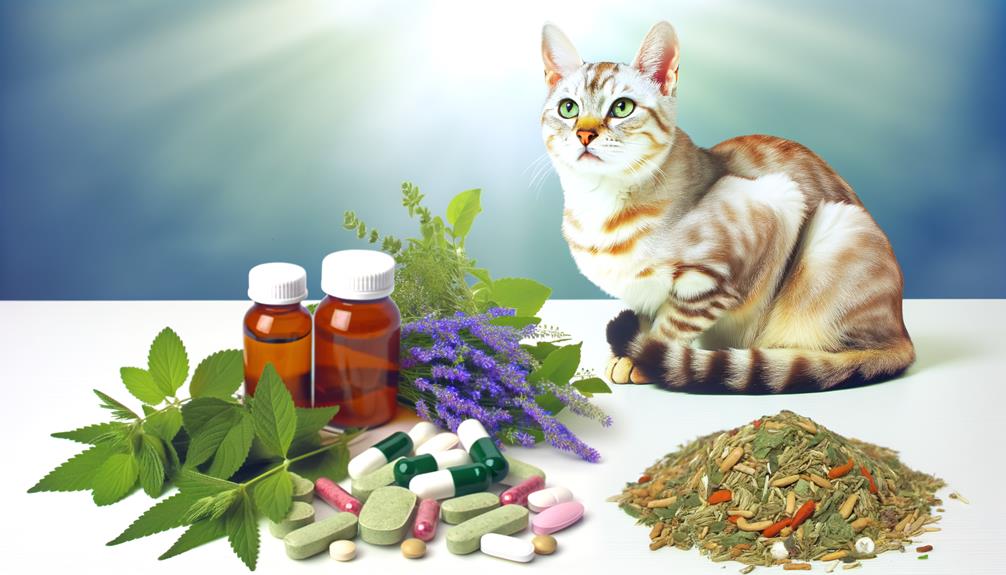
If your cat can't tolerate antibiotics or you're looking for a more natural approach, there are alternatives you might consider. These alternatives are often gentle on your cat's system while still providing relief from infections and other ailments.
Now, let's delve into some of these alternatives:
- Natural Remedies: Certain foods and supplements can naturally boost your cat's immune system. For instance, fish oil, probiotics, and antioxidants can enhance your cat's overall health and help fight off infection.
- Herbal Treatments: Herbs like Echinacea, Goldenseal, and Astragalus can be used to stimulate your cat's immune system. Always consult with a holistic vet before starting any herbal treatments.
- Homeopathy: This involves the use of minute doses of substances that would produce symptoms of the disease in larger amounts. These treatments are tailored to your cat's specific needs.
- Acupuncture: While not a direct alternative to antibiotics, acupuncture can boost your cat's immune system and improve their overall health.
Communicating With Your Vet
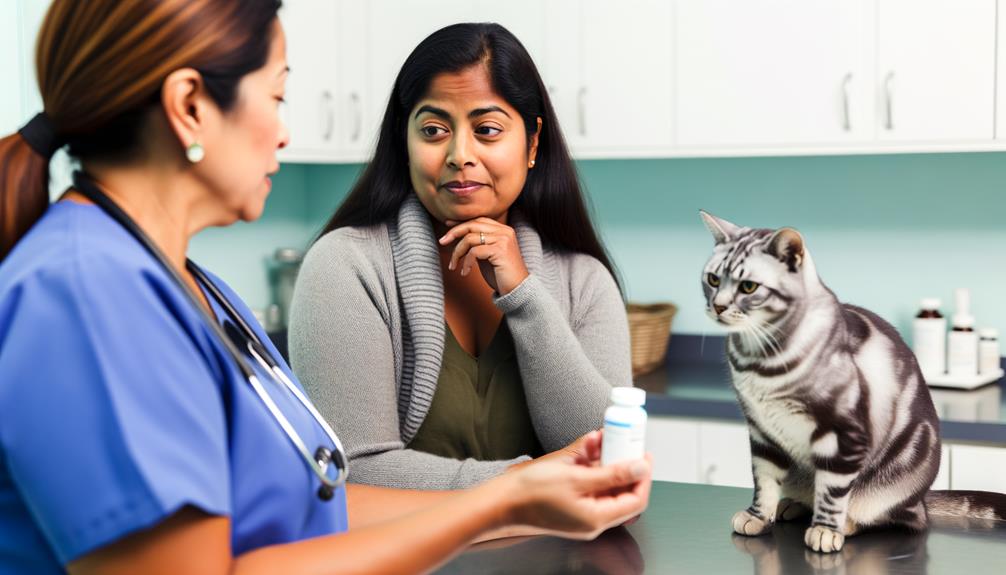
When it comes to your cat's health, it's crucial to have clear communication with your vet. You need to understand the prescriptions your vet gives and feel comfortable asking questions.
Let's discuss how to effectively communicate with your vet about antibiotics for your cat.
Understanding Vet's Prescription
To ensure your cat gets the best care, it's crucial that you fully understand your vet's prescription and know how to effectively communicate with them about it. Prescription interpretation is key to ensuring your pet receives the correct medication and dosage. Furthermore, your vet's transparency is vital in helping you understand the treatment plan.
Here are four steps to help you better understand:
- Ask your vet to explain any medical terms or abbreviations you don't understand.
- Request a written prescription to avoid any confusion.
- Get clarity on the frequency and duration of the medication.
- Request information on possible side effects or interactions with other medications.
Questions for Your Vet
Knowing what questions to ask your vet about your cat's antibiotics can make a world of difference in your pet's health. Start by inquiring about the vet's qualifications. You'll want to ensure they're qualified to diagnose and treat your cat.
Next, discuss the treatment costs. Ask for an estimate upfront, so you're not surprised by hefty bills. Remember, it's okay to ask for a breakdown of costs.
Don't forget to ask about potential side effects, durations of treatment, and what to do if your cat misses a dose. Understanding how and when to administer the antibiotics is critical.
Lastly, if your cat isn't improving or if side effects occur, know when and how to contact your vet. Your cat's wellbeing depends on these crucial conversations.
Antibiotic Resistance in Cats
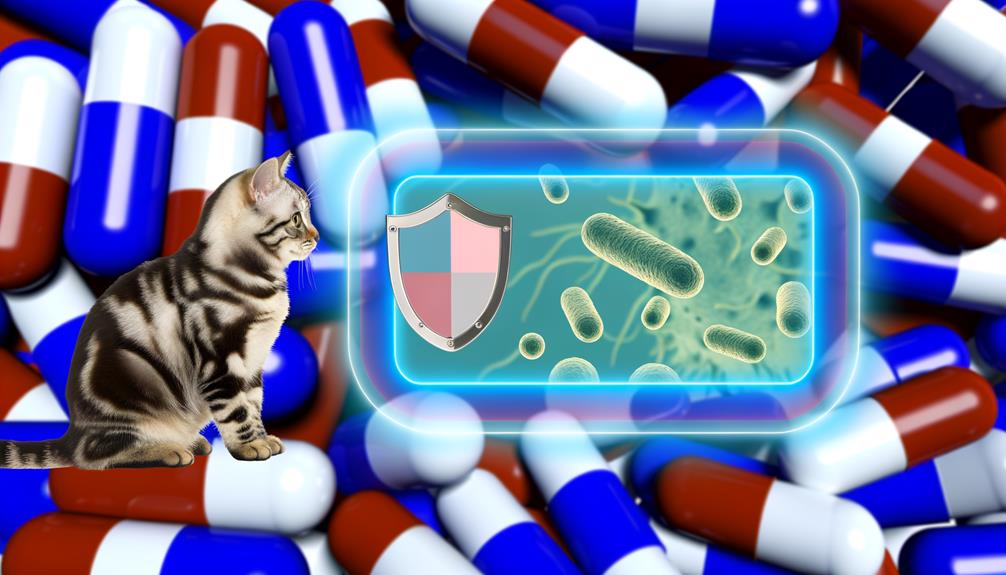
While your cat may have benefited from antibiotics in the past, overuse of these medications can lead to antibiotic resistance, making them less effective over time. This resistance development isn't just a concern for your pet, but also for global public health.
So, what can you do to prevent this? Here are four steps:
- Regular vet visits: Regular check-ups ensure early detection of diseases, reducing the need for antibiotics.
- Responsible use: Don't pressure your vet to prescribe antibiotics, and always complete the recommended dosage even if your cat appears better.
- Hygiene: Maintain a clean environment to minimize the risk of infections, thus reducing the need for antibiotics.
- Antibiotic alternatives: Discuss with your vet about alternatives such as probiotics, vaccines, or natural remedies.
Frequently Asked Questions
Can Human Antibiotics Be Given to Cats?
You shouldn't give human antibiotics to cats. It can lead to antibiotic overdose dangers. Always consult your vet for side effects management. They'll prescribe the right medication, dosage, and duration for your cat's condition.
Do Antibiotics Affect a Cats Behavior or Personality?
Yes, antibiotics can cause behavioral changes in cats. Side effects might include lethargy, changes in appetite or mood swings. It's crucial to monitor your pet's behavior while they're on medication to ensure their wellbeing.
How Does a Cats Diet Influence the Effectiveness of Antibiotics?
Your cat's diet can greatly influence the effectiveness of medication. Dietary adjustments affect nutrient absorption, which can either enhance or hinder how well an antibiotic works. So, it's important to monitor their food intake.
Are Certain Cat Breeds More Resistant to Antibiotics?
No, antibiotic resistance isn't breed-specific in cats. It's often caused by antibiotic overuse. However, individual cats may have breed-specific reactions to certain drugs, which doesn't necessarily indicate resistance.
Do Antibiotics Interfere With a Cats Vaccination Schedule?
Yes, antibiotics can interfere with your cat's vaccination schedule. It's important to consider antibiotic timing to avoid vaccination interactions. Always consult with your vet for the best health plan for your feline friend.
Conclusion
Taking care of your cat's health is crucial. Understanding the types and uses of cat antibiotics, their possible side effects, and the risks involved in misuse is key.
Always consult with your vet before administering any medication. Remember, antibiotics aren't a cure-all and alternatives may be available.
Stay vigilant for signs of antibiotic resistance. Ultimately, your cat's health and well-being should be the top priority.







